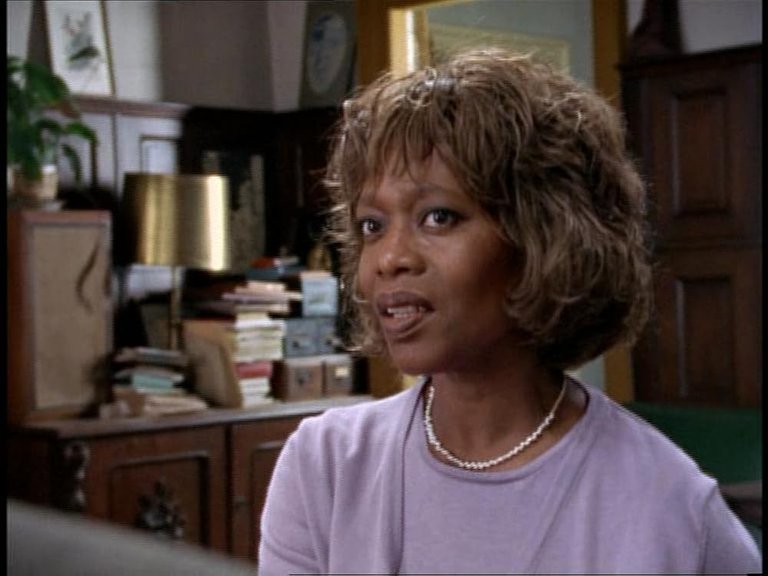Television Review: Mercy (Homicide: Life on the Street, S6X16, 1998)

Mercy (S06E16)
Airdate: 20 March 1998
Written by: Eric Overmyer
Directed by: Alan Taylor
Running Time: 45 minutes
The 1990s saw a proliferation of live-action television crossovers in the United States, wherein fictional universes expanded and intertwined, creating interconnected narrative ecosystems. Homicide: Life on the Street participated in this trend, most notably in its third season when it crossed over with Law & Order, embedding itself within the broader legal-police procedural universe. Three years later, in its sixth season, Homicide further blurred genre boundaries by collaborating with The X-Files and St. Elsewhere, the latter connection established in the episode Mercy. This episode, airing in 1998, exemplifies both the ambition and occasional strain of such crossovers, weaving together medical ethics, character-driven drama, and procedural storytelling while balancing multiple plotlines that occasionally dilute its focus.
St. Elsewhere, a critically acclaimed medical drama that aired from 1982 to 1988, shares a creative link with Homicide through co-creator Tom Fontana, who became an executive producer on the latter series. Mercy capitalises on this connection by centring its main narrative around Dr. Roxanne Turner (Alfre Woodard), a character who originated in St. Elsewhere as an obstetrician-gynaecologist. In this episode, Dr. Turner is now running a hospice, and her care of terminally ill patients becomes the focus of an investigation after a cancer patient’s death is deemed suspicious. The case is assigned to Detectives Pembleton and Bayliss, who uncover a pattern of terminally ill patients dying under Dr. Turner’s care. While Bayliss remains sceptical of wrongdoing, Pembleton grows convinced that Turner is orchestrating mercy killings, accusing her of “playing God” in a tense confrontation within the iconic “Box” interrogation room. Their clash underscores the episode’s central moral dilemma: the ethics of euthanasia, a topic that resonated with contemporary debates over Dr. Jack Kevorkian’s controversial practices and the nascent legalisation of assisted dying.
The episode’s subplot involving Detectives Ballard and Gharty, however, distracts from this central tension. Their pursuit of the McCord brothers—hillbilly fugitives from the earlier episode Shaggy Dog, City Goat—resumes when the duo reappears in Baltimore. Ballard and Gharty manipulate the brothers’ mother into surrendering them, a resolution that highlights the officers’ frustration with the pair’s ignorance of their legal rights. While this storyline adds character depth to Ballard and Gharty, its rushed conclusion feels underdeveloped, particularly given the episode’s already crowded narrative. The McCord case lacks the emotional weight of the Dr. Turner arc, serving more as procedural filler than a meaningful contribution to the episode’s themes.
Another subplot pairs rookie Detective Stivers with veteran Falsone on a double homicide involving a 12-year-old victim. Lt. Giardello warns them of the psychological toll such cases might take, a poignant reminder of the human cost of violent crime. Though initially stymied, the duo secures an arrest, showcasing Stivers’ potential while reinforcing the show’s procedural rigor. This thread, while competently executed, feels secondary to the central moral quandary of Dr. Turner’s actions.
The most problematic element, however, is the ongoing “Luther Mahoney Saga,” which continues its soap-operatic trajectory. Here, Kellerman attempts to sabotage Georgia Rae Mahoney by threatening to expose judicial corruption linked to her wrongful death lawsuit against the police. While this plotline adds tension, its repetitive nature and melodramatic tone mark it as the weakest component of the episode. By this point in the series, the Mahoney subplot had become overly convoluted, prioritising dramatic twists over substance, detracting from the more nuanced exploration of euthanasia.
Dr. Turner’s character, masterfully portrayed by Alfre Woodard, is the episode’s standout element. Woodard imbues Turner with quiet intensity, particularly in her exchanges with Andre Braugher’s Pembleton. Their ideological clash—Turner’s belief in compassionate care versus Pembleton’s rigid adherence to the law—mirrors the societal debate over assisted dying, a topic gaining urgency during the 1990s as states like Oregon legalised physician-assisted suicide. The interrogation scene in the “Box” is a masterclass in dramatic tension, with both actors conveying the weight of their convictions. Turner’s refusal to confess, despite Pembleton’s relentless pressure, leaves the moral ambiguity unresolved, a choice that mirrors the real-world lack of consensus on euthanasia.
Had Mercy focused solely on Dr. Turner’s story, it might have rivalled the series’ finest episodes. Instead, the inclusion of multiple subplots—particularly the undercooked McCord case and the increasingly tiresome Mahoney saga—dilutes its impact. While Homicide often thrived on balancing procedural elements with character development, Mercy overreaches, attempting to juggle too many threads without sufficient depth. The Stivers/Falsone subplot, though competently handled, feels perfunctory compared to the central ethical dilemma.
In its ambition to link Homicide with St. Elsewhere and explore contemporary moral issues, Mercy achieves a compelling core narrative. However, its reliance on ancillary plots weakens its overall cohesion. For all its ambition, Mercy serves as a reminder that even the best ideas can falter when stretched too thin.
RATING: 6/10 (++)
Blog in Croatian https://draxblog.com
Blog in English https://draxreview.wordpress.com/
InLeo blog https://inleo.io/@drax.leo
LeoDex: https://leodex.io/?ref=drax
Hiveonboard: https://hiveonboard.com?ref=drax
Rising Star game: https://www.risingstargame.com?referrer=drax
1Inch: https://1inch.exchange/#/r/0x83823d8CCB74F828148258BB4457642124b1328e
BTC donations: 1EWxiMiP6iiG9rger3NuUSd6HByaxQWafG
ETH donations: 0xB305F144323b99e6f8b1d66f5D7DE78B498C32A7
BCH donations: qpvxw0jax79lhmvlgcldkzpqanf03r9cjv8y6gtmk9